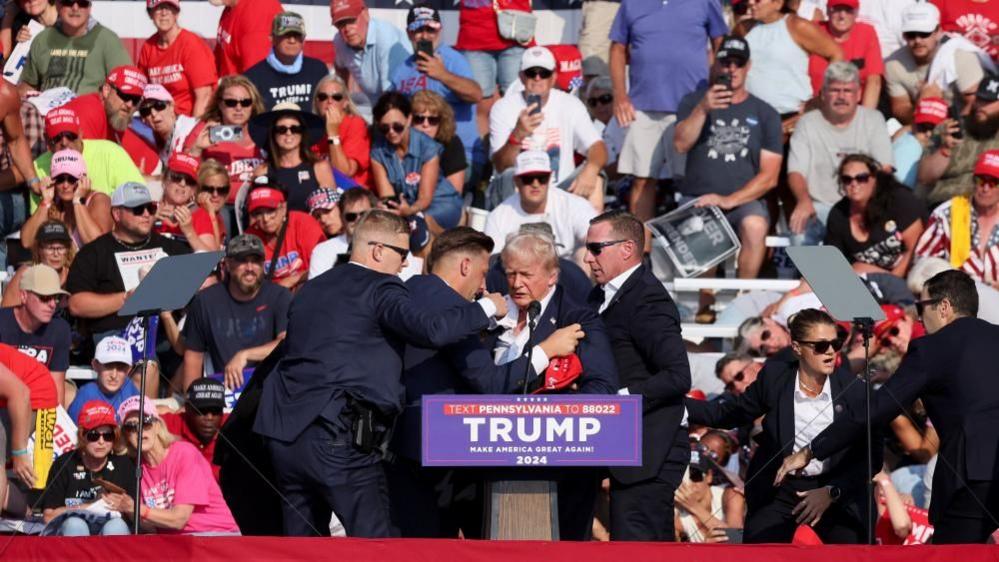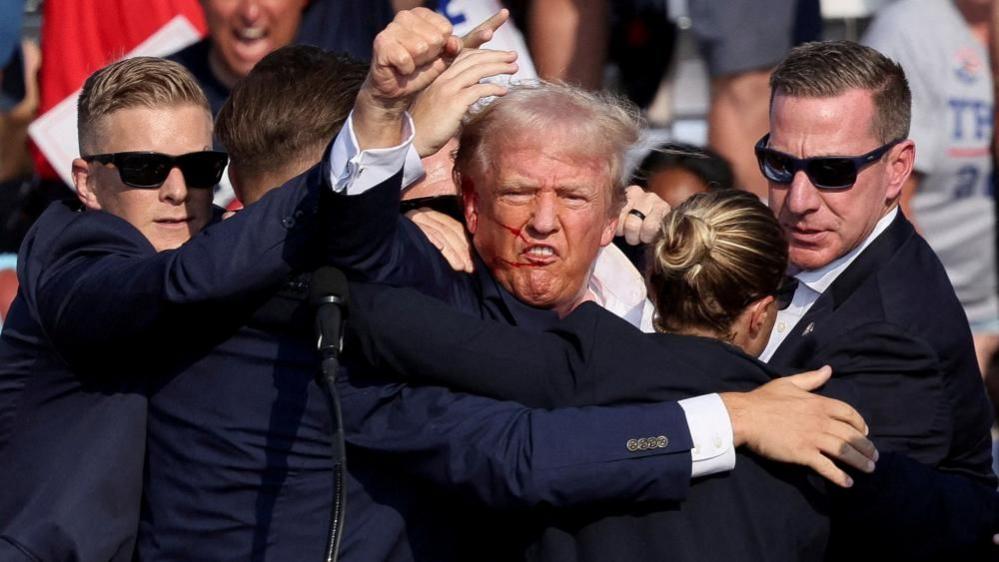How conspiracy theories and hate dominated social feeds after assassination attempt on Trump

False rumours swirled online seconds after Donald Trump was shot
- Published
“Staged”.
Within minutes of the news breaking about the assassination attempt on former President Donald Trump, that word was trending on X in the United States.
It's a word that has become synonymous with conspiracy theories on the fringes of social media, often to cast doubts on an attack or shooting. But in the last 24 hours it has flooded into mainstream online conversation, and posts filled with evidence-free speculation, hate and abuse have racked up millions of views on X.
Assassination attempts on US presidents have in the past been magnets for conspiracy - the killing of John F Kennedy in November 1963, most famously. This one was the first to play out in real time, so it’s not surprising that unfounded rumours flourished.
But what has stood out is how this frenzy gripped all sides of the political spectrum.
It’s not been limited to committed groups of political supporters. Instead, it was actively recommended in users’ “For You” feeds as they tried to make sense of what had happened. And it was often posted by users who have purchased blue ticks, offering their posts greater prominence.
'Staged' conspiracies go viral
As ever, the conspiracy theories sometimes started with legitimate questions and confusion. They centred on alleged security failings, with lots of users understandably asking how this could happen.
How did the attacker make it to the roof? Why weren’t they stopped?
Into that vacuum rushed a wave of disbelief, speculation and disinformation.
“It looks very staged,” read one post on X which racked up a million views. “Nobody in the crowd is running or panicking. Nobody in the crowd heard an actual gun. I don’t trust it. I don’t trust him.”
The profile says it’s based on the south-west coast of Ireland. Its since been labelled with a note on X pointing out the shooting was real.
Once more footage and testimony from both inside and outside the rally was shared, the panic and fear of those there became all too clear.
Allow X content?
This article contains content provided by X. We ask for your permission before anything is loaded, as they may be using cookies and other technologies. You may want to read X’s cookie policy, external and privacy policy, external before accepting. To view this content choose ‘accept and continue’.
The conspiracies were compounded by the extraordinary images that have come out since those initial clips. In particular, a widely-praised photograph taken by the Associated Press chief photographer in Washington, Evan Vucci, that shows Trump, fist raised, blood on his face and ear, with the US flag in the background.
One US-based YouTube account said the picture was just “too damn perfect” and described how they got “the flag positioned perfect and everything”. The post on X reached almost one million views - but was later deleted by the person who shared it. It’s important to correct yourself if you’re wrong, they said in a separate post.
Others pointed out that, as the shots were fired, Trump raises his hand on stage. They used this to suggest the event was set up when there’s no evidence to suggest that.
“Staged to get sympathy? You can’t trust these people with anything and no, I’m not going to pray for him,” a different US-based commentator wrote.
Lots of the most viral posts, including this, came from left-leaning users who regularly share their anti-Trump views. They already had hundreds of thousands of followers before today - and therefore a significant reach.
Watch now on iPlayer
'Satanic Cabals'
What unfolded on X was straight out of the pages of the conspiracy theory playbook, honed on social media by committed activists who deny the reality of almost everything, including the Covid pandemic, wars, mass shootings and terror attacks.
One post from a US-based account with a track record of sharing unfounded claims like this wrote: “This is price you pay when you take down the elite satanic paedophiles.”
They were alluding to the QAnon conspiracy theory, which suggests Trump is waging a secret war against a deep state - a shadowy coalition of security and intelligence services, hidden from plain sight, looking to thwart his every move.
Without any evidence to support the idea, they then went on to suggest the “order” for the assassination “likely came from the CIA” and accused Barack Obama, Hillary Clinton and Mike Pence of being involved. There is no evidence to support any of that - but the post has been seen 4.7 million times.

Many of those speculating were social media accounts that regularly spread disinformation
It’s a familiar pattern, but the real change here is how this kind of lingo is being widely used by the average social media users. That’s not only people who don’t like Trump suggesting this was staged, but also ones who support him alleging this is part of a sprawling conspiracy theory.
Elected politicians have also got involved. Congressman Mike Collins, a Republican in Georgia, posted that “Joe Biden sent the orders”. He referenced a comment President Biden had made earlier in the week about putting “Trump in a bullseye”, referring to their election battle.
There are legitimate questions being asked about some of the language used to describe Trump by other politicians and the media, as well as online, which some of Trump’s supporters argue has inflamed tensions and contributed to this assassination attempt. But to suggest this was ordered by President Biden is an entirely different proposition all together.
Collins’ post has more than 6 million views on X - but has since been labelled with a community note, which says there is no evidence Mr Biden was involved in any way. It added that his “bullseye” remark has been taken out of context.
False accusations about shooter’s identity
Incorrect attempts to identify the shooter fed into the various evidence-free narratives.
Before the FBI named the gunman as 20-year-old Thomas Matthew Crooks, who was shot and killed by the Secret Service, other people’s reputations were being ruined.
Like football commentator Marco Violi, who posted on Instagram in the middle of the night from Italy to say he’d seen the totally false claims he was a member of Antifa - a loose affiliation of mostly far-left activists - and behind the attack. Those untrue allegations had millions of views on X by the time he attempted to set the record straight on Instagram.
On X, political activists and supporters quickly hunkered down in their own echo chambers, reading posts that were recommended by the site’s algorithm and confirmed what they already thought. The rest of us scrambled to avoid this deep pit of conspiracy and speculation.
This was a test for Elon Musk’s new Twitter - and it’s hard to say the site passed with flying colours.
The other social media sites haven’t been inundated in the same way, perhaps because of their target audience and X’s reputation as a home of political discourse.
X has not responded to the BBC’s request for comment.
What happened at the Trump Rally? Listen to the latest episode of Americast on BBC Sounds.